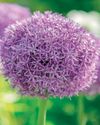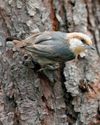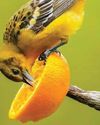
HARDINESS INFO Dahlias, including Redwood Honeybee, are hardy in Zones 8 to 11, which means tubers can stay in the ground over winter.
1 Redwood Honeybee
The 5-inch blooms of Redwood Honeybee are a blend of yellow and pinkish orange. It starts blooming around eight to 10 weeks after planting and continues to flower until a killing frost if deadheaded. This cultivar stands tall in the garden, with stalks growing up to 6 feet tall.
Why we love it: The plant is always decorated by half a dozen blooms at a time, which make excellent cut flowers.
2 KA's Papa John
Named after the plant's creator, KA's Papa John is an award winner and has some of the highest scores in trial gardens across the U.S. and Canada. It's an impressive specimen with great form, a large size and a bounty of huge, pure white blooms. The flower heads can measure a colossal 8 to 10 inches in diameter.
Why we love it: The wavy petals and bright white color make the blooms almost look like a bowl of soft serve vanilla ice cream.
3 Oldoc Combustion
This orchid-type dahlia stands 5 to 7 feet tall, and the 2- to 3-inch star-shaped blooms are a favorite of monarch butterflies. Its name comes from the fiery effect of the flowers and the fact that the hybridizer (the person who bred the plant) is a practicing veterinarian with a few years under his belt.
Why we love it: The curl and colors of the flower, yellow in the front and red in the back, lend it a flamelike appearance.
WHERE TO BUY Because these dahlias are fresh releases, they might not be available in garden centers. To add these beauties to your garden, look online. The tuberous roots ship well and can be planted in spring. Go to dahlia.org for more new plants and ideas.
This story is from the August/September 2022 edition of Birds & Blooms.
Start your 7-day Magzter GOLD free trial to access thousands of curated premium stories, and 9,000+ magazines and newspapers.
Already a subscriber ? Sign In
This story is from the August/September 2022 edition of Birds & Blooms.
Start your 7-day Magzter GOLD free trial to access thousands of curated premium stories, and 9,000+ magazines and newspapers.
Already a subscriber? Sign In

Basics of Hydroponics
Use these top tips and plant picks to have a successful soil-free garden

Rooted in Resilience
These hardy perennials will thrive in most zones

Social and Supportive
Brown-headed nuthatches take a helpful approach to raising their young

All About Owl Pellets
And why you should give a hoot about them

Ask the Experts
Advice from our pros about houseplants, bird feeding and more

BRING THE OUTDOORS IN
Making a terrarium is about as close as you can get to a Zen DIY project. Once you have gathered the proper materials and squared away your plant selections, it's as simple as layering it all together and watching your mini ecosystem thrive. Here, I'll walk you through my foolproof process and cover all the required elements for good filtration, healthy soil, strong root growth and resistance against fungus and disease.

GROW THIS. NOT THAT
Six easy-to-grow houseplants—and six that may not be the right choice for you

Winter MAGIC
Forecasts may be frigid, but grab your binoculars because birding opportunities are still incredible

Sense or Nonsense? - Why some birds can taste and smell - but others can't
Does a porcelain berry taste like a blueberry to a gray catbird? Does a block of lard smell like frying bacon to a northern flicker? The short answer is no. While some avian species do have a well-adapted sense of taste or smell, they can't distinguish between flavors and odors the way humans can. They're not picking up every ingredient in the suet you put out, says José Ramírez-Garofalo, an ornithology researcher at Rutgers University in New Jersey and the director of Freshkills Biological Station in Staten Island, New York.

Maple Mania - Amazing facts about this fall foliage mainstay
Amazing facts about this fall foliage mainstay